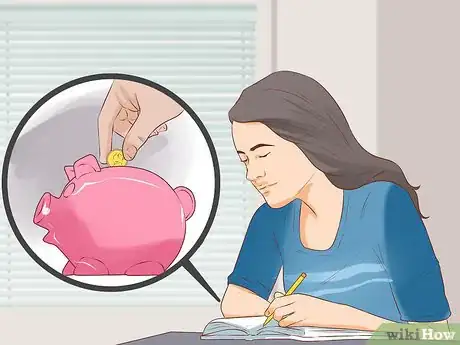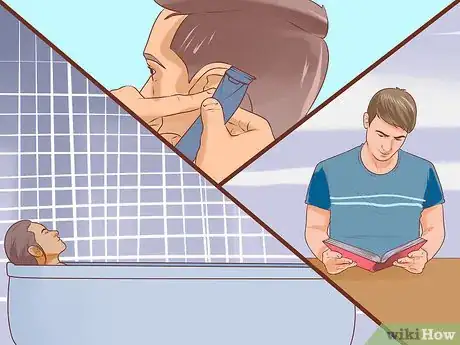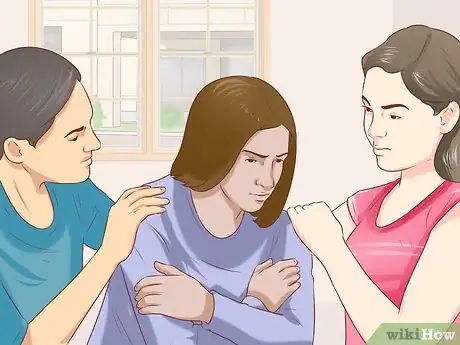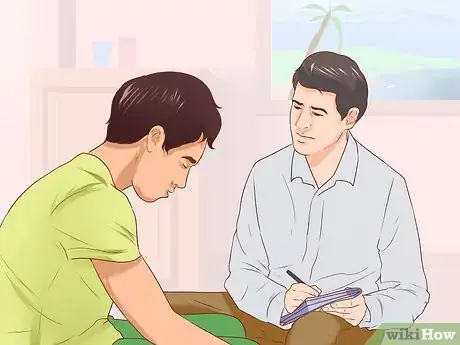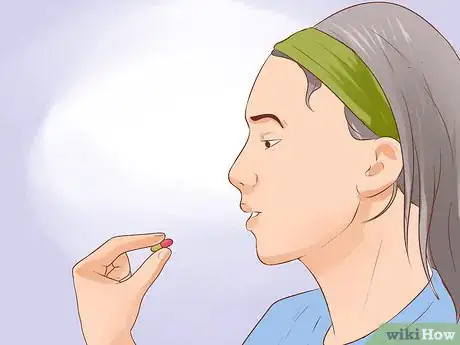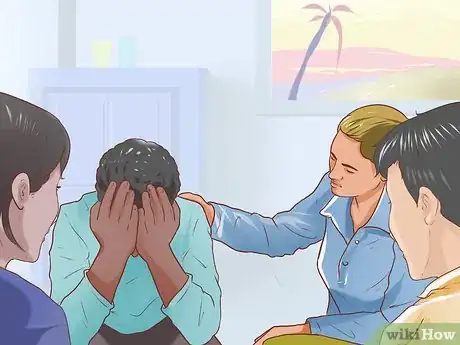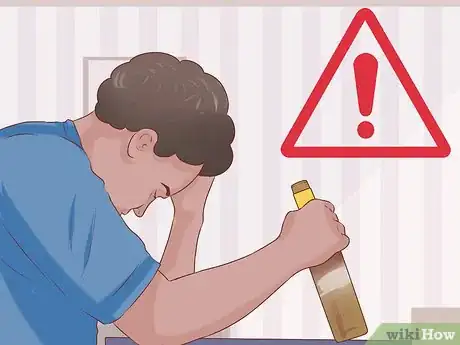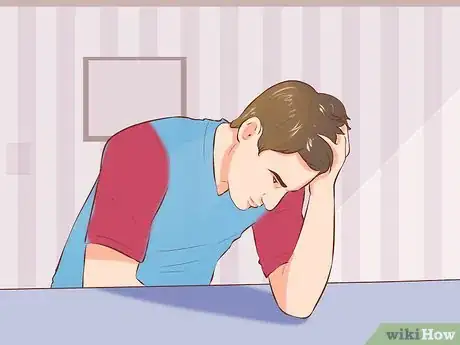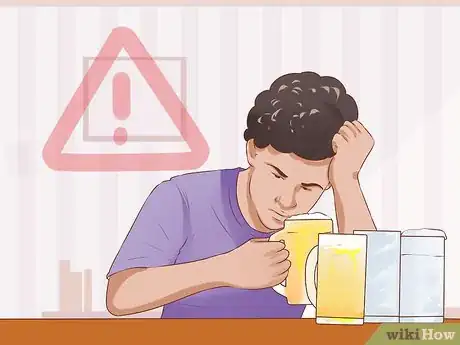This article was co-authored by Klare Heston, LCSW. Klare Heston is a Licensed Independent Clinical Social Worker based in Cleveland, Ohio. With experience in academic counseling and clinical supervision, Klare received her Master of Social Work from the Virginia Commonwealth University in 1983. She also holds a 2-Year Post-Graduate Certificate from the Gestalt Institute of Cleveland, as well as certification in Family Therapy, Supervision, Mediation, and Trauma Recovery and Treatment (EMDR).
There are 10 references cited in this article, which can be found at the bottom of the page.
This article has been viewed 14,433 times.
Being yourself is sometimes the most difficult thing you can try to do, especially if you feel like you have to hide how you’re really doing. Putting on an act may seem easy at first, but over time, you may notice it has a negative effect on your well-being. Learning how to stop pretending you’re okay is possible once you realize the dangers of putting on this act, feel more comfortable being yourself, and get help.
Steps
Making Personal Changes
-
1Stop worrying about what others think. To be yourself and stop pretending, you have to stop analyzing how you come across to others. Not focusing on how you’re acting allows you to instead focus on what you’re doing, which is when people are typically themselves.
Not constantly seeking approval from others by pretending to feel good when you don’t, allows you to be yourself, which is usually more enjoyable than putting on a charade.[1]
Whenever you catch yourself worrying about others' opinions of you, quickly evaluate your situation. Are you okay with the choices you're making? If so, push away any nagging feelings that others are not. Your opinion is the only one that is necessary for your happiness.
This may feel difficult to change at first, but keep trying. If you find that you really cannot stop focusing on the opinions of others, consider talking to a counselor. Chronic self-doubt can lead to self-esteem issues, as well as depression. -
2Express yourself. A part of the reason you may feel forced to keep pretending you’re okay is because you don’t feel comfortable speaking up for yourself. Another part of the reason people pretend to be okay is to please others. When you learn assertiveness you are respecting yourself by stating your needs and opinions while also being respectful of others. It’s a win-win.[2]
- If you have an idea, opinion, or desire, share it. If you’re worried about coming across too strong, use “I” statements like “Hey, I think it’s a great idea to start on the packing early. However, I think our time would be better served if we started with the rooms we use the least—like the library and dining room.”
Advertisement -
3Learn to say “no.” Odds are, you probably agree to favors and tasks for others because you don’t feel confident enough to decline. Start today and only say “yes” to requests that serve you or make you happy.[3]
- Say, “I know you need help with babysitting this week, sis. Unfortunately, I have a big test coming up in chemistry and need to study.” You’ll feel better, and others may start being more respectful of your time.
-
4Make a list of actionable goals. Ask yourself if you think you need to change. Are you happy with the way you are? Sometimes, we pretend with others because we are not the people we would like to be.
Instead of pretending to be something you’re not, why not invest your energy into becoming more familiar with who you are? Get to know your personal thoughts, feeling, and preferences. Then, set some goals for yourself based off of those.[4]
If you truly think change in some area of life will benefit you, sit down and make a list of small actionable goals. For example, if you are struggling financially, you might include goals like “start an emergency savings” and “pick up a second job.” -
5Practice self-love. In a world where everyone is always complaining about their weight, their income, or their relationships, it can seem illegal to actually love yourself. Even if you spot areas in your life that need improvement, you are still worthy of showing yourself compassion.
When you love yourself and treat yourself as you would your very best friend, you are less inclined to care what others think and thereby hold in who you truly are.
Show self-love and compassion by being gentle with yourself. Think of what you really need. If you feel tired, reduce your activities and get some rest.
Practice regular self-care by doing things that relax and calm you. Make an appointment at the spa. Get your hair cut or styled. Take a luxurious bubble bath. Read that new spy novel you’ve been hearing about.
Getting Help for Sadness
-
1Reach out to friends and loved ones. When you’re feeling down take advantage of your close social circle for support. Don’t be afraid to ask for help, a shoulder to cry on, or an outing to help cheer you up.[5]
- Think of someone you trust and openly share what’s been going on with you. If you think you need professional help, ask your loved one to accompany you. Asking for help can be as simple as saying “I’ve been feeling really sad lately and can’t seem to get over it. Do you have a moment to talk?”
-
2See a professional. In order to truly feel better about yourself you need to identify some of the possible reasons for your unhappiness. You may require the help of a therapist to really get to the root of your feelings.
In therapy, you have the opportunity to really get honest with yourself and answer personal questions that allow you to dig deep and understand the sources of your unhappiness. Once you determine why you aren’t okay, you can then take the steps you need to get better.[6]
You can find a good therapist by consulting with your primary care doctor. Ask your doctor to give you a mental health referral to a counselor that deals with depression, anxiety, or adjustment disorders. -
3Take medication to help with your feelings. A doctor may prescribe medication to help you overcome what you are going through. Whether it is anxiety, depression, or other issues that are causing you to hide what you’re really feeling, your doctor might give you medicine that can make you feel better.
If you are suffering from severe depression, medication may be a useful tool for fully participating in therapy and feeling better about yourself.[7]
It's important to note, however, that medication is not a cure-all. People with depression are best treated with a combination of psychotherapy and medication. Your doctor may also suggest that you make lifestyle changes like eating better, exercising, and developing a social support system. -
4Join a support group. Sometimes talking to others who are experiencing the same things you are is what can help the most. You may be able to receive advice on how to stop hiding how you feel. You may also receive help combating the issues you are struggling with, which can make you feel much better about yourself.
- For help finding a support group near you, ask your doctor or therapist for recommendations. You can also look for online support groups, if you can’t find any in your area or would participate in the group in private.[8]
Realizing the Dangers of Pretending
-
1Be wary of self-medicating. Know that you can turn to the wrong things when looking for happiness. Hiding yourself from your feelings can result in dangerous behaviors, such as drug and alcohol abuse. People who don’t want to confront their feelings and thoughts may turn to drugs and alcohol to mask their pain or emotions.
Using this as a coping mechanism may feel like it’s the right thing to do in the moment, but they can create health problems, as well as emotional issues for you in the future.[9]
Signs that you are struggling with substance abuse include hiding the behavior from your friends and family, experiencing withdrawal symptoms when you aren’t using, having problems going to school and work because of your habit, and hurting yourself and others when you use.[10] -
2Understand you may experience depression. Pretending to be OK when you’re really not may seem like a good idea at first, but you may fall into a downward spiral of depression because of it. Feeling like no one knows what you are going through can create a feeling of isolation, which can cause the inescapable sadness.
- Eventually you may find yourself not able to get out of bed, distancing yourself from your friends and loved ones, and engaging in dangerous behavior. Depression is a serious illness, but there are treatment options to help you cope with this condition.[11]
-
3Realize you may start to doubt yourself. Attempting to “fake it ‘till you make it” is essentially telling everyone around you a lie. After time, you may lose trust in yourself because of the lie you constantly tell. This may result in you hating yourself and engaging in self-destructive behavior, which makes you even more unhappy.[12]
If you find yourself engaging in self-destructive behavior, turn to a close friend or family member. Tell this person how you're feeling, "Hey, Pam, I've been doing pretty bad lately. I haven't been getting work done and sleeping all day. I've also been drinking more. I really need a friend to talk to."
Journaling may also help you when you find yourself pretending. Sometimes, we may have dark thoughts that we don't feel comfortable sharing with loved ones. You can use a blank piece of notebook paper to unload these feelings. Journaling also helps you identify negative thought patterns and can be an important problem-solving tool.
References
- ↑ https://markmanson.net/stop-trying-to-be-happy
- ↑ http://psychcentral.com/lib/5-tips-to-increase-your-assertiveness/?all=1
- ↑ http://psychcentral.com/lib/5-tips-to-increase-your-assertiveness/?all=1
- ↑ http://tinybuddha.com/blog/accept-yourself-as-you-are-even-when-others-dont/
- ↑ http://tinybuddha.com/blog/when-youre-pretending-to-be-fine-9-tips-to-cope/
- ↑ https://psychcentral.com/depression/where-to-get-help-for-depression
- ↑ http://www.clinical-depression.co.uk/dlp/treating-depression/getting-help-with-depression/
- ↑ https://www.youthbeyondblue.com/do-something-about-it/treatments-for-anxiety-and-depression
- ↑ http://tinybuddha.com/blog/when-youre-pretending-to-be-fine-9-tips-to-cope/



